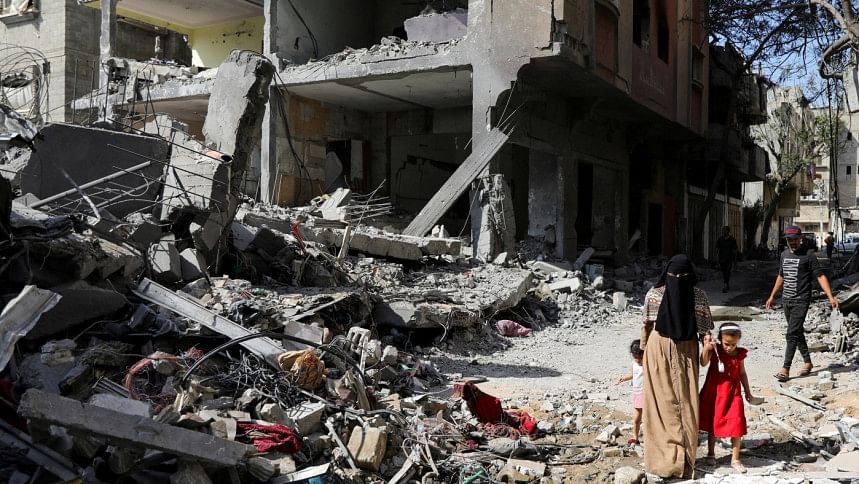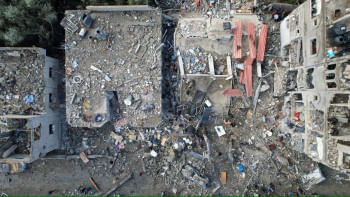Reflections on the Israel-Hamas war in the wake of fragile ceasefire

"Each man's death diminishes me, /For I am involved in mankind, / Therefore, send not to know /For whom the bell tolls, /It tolls for thee."
- For Whom the Bell Tolls (John Donne)
The recent ceasefire between Israel and Hamas, initiated on January 19, 2025, provides a brief pause in the ongoing humanitarian catastrophe in Gaza, following a 15-month Israeli Defence Forces' (IDF) genocidal campaign that has claimed the lives of over 47,000 Palestinians—with the unofficial figure reaching a staggering 200,000, epitomising ethnic cleansing. The majority of those killed have been civilians, including women, children, and the elderly, with the toll continuing to rise as debris from demolished buildings, precariously sitting atop over an estimated 30,000 unexploded munitions, is cleared. While the ceasefire is a welcome development, it occurs at a time when the failure of military strategies to resolve the region's broader political crisis is compounded by the epistemic violence that denies Palestinians their fundamental right to exist within the framework of a two-state solution, despite widespread global advocacy. The 42-day ceasefire agreement, which includes prisoner exchanges and negotiations for further hostages' release and Israeli troop withdrawal from Gaza, arguably preserves Israel's stated right to "return to war" at its discretion, as articulated by Netanyahu, who is under mounting domestic pressure to renege on the truce, leaving the region hopelessly devoid of a clear path to lasting peace.
US foreign policy remains pivotal in shaping the conflict's trajectory. Critics such as Professors Jeffrey Sachs of Columbia University and John Mearsheimer of the University of Chicago, among others, have sharply condemned US interventionism. Sachs critiques the Biden administration's unwavering support for Israel amid mounting war crime allegations, while Mearsheimer highlights the disproportionate influence of pro-Israel lobbying, which impedes balanced US resolutions. Both critiques underscore the need for a fundamental reassessment of US policies, which undermine Washington's credibility as a neutral mediator. Compounding the complexities are conflicting claims of credit for the ceasefire agreement. Both Joe Biden, the incumbent president during that time, and Donald Trump, current president-elect, claimed to have influenced Netanyahu's decision to agree to the truce. The Israeli newspaper Haaretz reported that Biden's administration used back-channel diplomacy to exert pressure, while Trump highlighted his rapport with Netanyahu and the legacy of the Abraham Accords as key factors. These competing narratives underscore the polarised and contentious role of US leadership in the region.
As regional power dynamics shift in an uncharted direction—with Israel and Turkey at odds over their conflicting ambitions to remake the Middle East, alongside the increasing marginalisation of Iran, which has led it to sign a 20-year defence pact with Russia—the US must recalibrate its role to foster stability. Sachs' and Mearsheimer's insights emphasise the need for the US to redefine its leadership in the Middle East, prioritising its own best interests by advocating for a just and enduring resolution to the Israeli-Palestinian conflict. Any procrastination in this matter would be counterproductive, even metastatic.
Jeffrey Sachs on US policy and Biden's legacy
In his 2024 Cambridge speech, Sachs sharply criticised US foreign policy, which he argued had become increasingly influenced by lobbyists and special interest groups, leading to widespread global instability. Sachs pointed to the Biden administration's unwavering support for Israel during its Gaza campaign, despite mounting international criticism and evidence of war crimes. He contended that this alignment not only ignored global calls for a ceasefire but also rendered the US complicit in what many viewed as an act of genocide. The term "Genocide Joe" quickly gained traction, reflecting the global outrage at Biden's approach, especially after the devastating civilian toll in Gaza. Secretary of State Antony Blinken's vocal defence of Israel and its military operations further tainted Biden's legacy, isolating the US from its European allies and undermining its credibility as a neutral mediator in the Israel-Palestine conflict. The Biden administration's refusal to recalibrate its position, even in the face of overwhelming evidence of human rights abuses, drew sharp criticism from human rights groups, progressive factions within the US, and the international community. In addition to concerns over Biden's age-related frailty, mounting political pressure and backlash over his handling of the Gaza war ultimately led to his withdrawal from the 2024 presidential race, despite a decisive primary victory. His departure on July 21, 2024, paved the way for Vice President Kamala Harris's nomination, but her failure to secure the presidency, alongside Democratic losses in Congress, underscored the broader political fallout of Biden's Gaza policy. The election outcome reflected the deepening disillusionment with US complicity in Israel's military actions, further entrenching the region's instability and exposing the limits of US diplomacy in the conflict.
John Mearsheimer's realist analysis: The power of US lobbying complementing Sachs' critiques
Mearsheimer, a prominent political theorist and co-author of The Israel Lobby and US Foreign Policy, has long argued that US foreign policy in the Middle East is disproportionately shaped by the influence of a powerful pro-Israel lobby. His realist perspective emphasises the strategic interests underlying US actions, rejecting the notion that these policies are guided by moral imperatives. He contends that this lobby has fostered policies that prioritise Israel's security and geopolitical dominance, often at the expense of broader regional stability and US interests. According to Mearsheimer, these decisions have led the US to back measures that result in prolonged conflicts, devastating humanitarian crises, and deepening regional resentment, as vividly illustrated by the recent war in Gaza. His work underscores how this alignment has entrenched the status quo, perpetuating Israeli occupation and undermining the viability of a two-state solution or other pathways to lasting peace. He critiques the United States for allowing its foreign policy to be shaped more by domestic political considerations and lobbying influences than by the realities on the ground or the principles of international law. Mearsheimer's insights resonate with Sachs' call for a profound re-evaluation of US policy in the region—one that demands both moral courage and intellectual engagement. Together, their critiques challenge the US to move beyond addressing the symptoms of conflict and instead confront the structural and ideological factors that fuel cycles of violence and instability.
A chip off the old block: Trump's hardline continuity in the Israel-Palestine crisis
Trump's approach to the Israel-Palestine crisis, though polarising, prioritised diplomatic deals like the Abraham Accords, which normalised Israel's ties with several Arab nations while sidelining Palestine. These accords signalled a shift towards regional de-escalation but failed to address the core Palestinian issue. In contrast, Biden's unwavering support for Netanyahu during the Gaza war drew global condemnation, further entrenching US complicity in the crisis.
However, Trump's second term has revealed a cooling relationship with Netanyahu, whom he now sees as a self-serving opportunist. While distancing himself from Netanyahu's leadership, Trump has doubled down on his hardline stance—most recently calling for the mass expulsion of Palestinians from Gaza to Egypt and Jordan, a proposal that has sent shockwaves across the region. This demand not only undermines any claim of being a "leader for peace" but also pushes the crisis into dangerous new territory, echoing historical patterns of Palestinian displacement while ultimately appeasing and emboldening Netanyahu beyond his own expectations. Mearsheimer has condemned this proposal as "morally reprehensible" and a plan for ethnic cleansing that is unlikely to succeed, aligning with his 2010 article, where he warned that mass expulsion could fuel further instability.
In late 2024, Trump uncharacteristically lauded Sachs' critiques of Biden's foreign policy, leveraging them to justify his backhanded call for a recalibrated US role in the Middle East. However, the fallout from his most recent outlandish announcement, upon meeting Netanyahu, proposing the US takeover of the Gaza Strip—following the forceful displacement of its population to Egypt and Jordan in violation of the Geneva Convention and other international treaties—and its redevelopment into a "Riviera of the Middle East," potentially funded by Arab countries, has sparked widespread condemnation. Critics denounce it as a neocolonial fantasy that ignores the region's complex history, tramples on Palestinian sovereignty, and exacerbates the ongoing humanitarian crisis. Moreover, it plays into the hands of the orthodox Jewish coalition in power under Netanyahu, advancing their expansionist agenda far beyond its own strategic calculations. Others see it as a bombastic bargaining chip aimed at pressuring Arab countries, particularly Saudi Arabia, into accepting an Abrahamic Accord that sidelines the two-state solution for the Palestinians, further eroding the US role as an honest mediator in the region. As Trump administration scrambles for words to explain what he actually meant, beyond what he characteristically doubles downs on, it remains to be seen how this realpolitik actually unfolds.
The ceasefire deal: A fragile framework
The ceasefire agreement between Israel and Hamas is divided into three phases. The first phase, lasting 42 days, provides an opportunity to pause hostilities and initiate efforts to address deeper, more contentious issues through subsequent negotiations.
This phased approach underscores the formidable challenges of achieving lasting peace, including the supply of humanitarian aid. Hostilities have been halted to facilitate the delivery of critical humanitarian relief to Gaza. However, the massive scale of destruction and deep-rooted mistrust between the parties complicate the efficient and equitable distribution of aid.
Another challenge involves stabilisation and reconstruction. Efforts to rebuild Gaza's infrastructure and foster trust are significantly hindered by ongoing blockades and the absence of international assurances for Palestinian sovereignty. These barriers undermine prospects for long-term stability.
Political negotiations remain another key challenge. Contentious issues such as borders, the right of return for refugees, and the status of Jerusalem remain unresolved. The elusive two-state solution continues to highlight the entrenched complexities of this enduring conflict.
While the ceasefire offers a temporary reprieve from violence, its ultimate success rests on the willingness of both parties to confront and resolve these deeply rooted challenges.
Israel's unmet objectives
Israel entered the war with clear objectives: dismantling Hamas, securing its borders, and restoring deterrence. However, these goals remained largely unfulfilled. Despite Israel's overwhelming military force, Hamas survived and continued to maintain its position. Meanwhile, the humanitarian devastation in Gaza has further isolated Israel on the global stage. International calls for accountability have intensified, with many pointing to potential violations of the Genocide Convention. The International Criminal Court (ICC) and other international bodies have scrutinised Israel's actions. In November 2024, the ICC issued arrest warrants for Israeli Prime Minister Benjamin Netanyahu, and former Defence Minister Yoav Gallant, along with Hamas leader Mohammed Diab Ibrahim Al-Masri, known as "Deif"—killed in an Israeli airstrike in the Gaza Strip on July 13, 2024. These warrants accuse them of crimes against humanity and war crimes, including murder, torture, and the use of starvation as a method of warfare. This legal scrutiny adds a layer of complexity to future peace negotiations, as Israel's international standing continues to be undermined by these allegations. The involvement of organisations like the United Nations Human Rights Council has further deepened the global push for accountability, creating significant pressure on Israel's government and complicating its ability to navigate diplomatic relations moving forward.
US responsibility and the unfolding arc of history: Beyond war and hegemony
The Israel-Hamas war exposes the complex intersection of power, ideology, and human suffering, with the ceasefire offering only a fleeting respite in this volatile region. Sachs and Mearsheimer urge us to confront both the moral and strategic stakes of the crisis.
Trump's foreign policy, despite claims of pragmatism and transactionalism, largely struggles to balance questionable strategic interests with moral imperatives. The future of US foreign policy depends not only on restoring credibility but also on addressing an unfolding global moral crisis. Furthermore, policy outcomes are shaped by a range of known and unknown variables, underscoring the limits of our bounded rationality in navigating these complex challenges, and reminding us not to squander the window of opportunity when it finally arrives. As a self-proclaimed leader of the free world, the US cannot abdicate its responsibility in shaping global outcomes. Surrendering the future of the Middle East to the whims of Netanyahu & Co and yielding the "pivot to Asia" to China's Belt and Road Initiative would be a profound strategic miscalculation. Washington must assert its leadership—not through the power of the pulpit—but by ensuring regional stability and upholding the moral and political values that define its global role. That undoubtedly includes the recognition of the Palestinian right to a two-state solution.
The so-called "arc of history" remains a contested metaphor. Hegelian optimism and Kantian progress collide with Marxist materialism, Nietzschean scepticism, and postmodern critiques. History is not an inexorable moral trajectory but a battleground of power and human agency. The failure of war and hegemony as instruments of peace reinforces an enduring truth: military dominance begets destruction, not resolution, and no one truly emerges victorious, as poignantly captured by John Donne's metaphor of death and the interconnectedness of humanity in the epigraph.
Eliot's "cunning passages" serve as a cautionary metaphor, reminding us that history is neither linear nor inevitable, but is instead riddled with hidden turns and obstacles. The pursuit of peace demands deliberate action, strategic diplomacy, and an unequivocal rejection of war as a means of progress for all.
Dr Faridul Alam writes from New York City, US.
Views expressed in this article are the author's own.
Follow The Daily Star Opinion on Facebook for the latest opinions, commentaries and analyses by experts and professionals. To contribute your article or letter to The Daily Star Opinion, see our guidelines for submission.

 For all latest news, follow The Daily Star's Google News channel.
For all latest news, follow The Daily Star's Google News channel. 










Comments